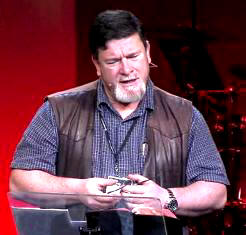Church must repent of sin of anti-Semitism

An Anglican clergyman has called on the Church to repent of its anti-Semitism, which he described as a sin against the Holy Spirit.
The Reverend Simon Ponsonby, an author and theologian based at St Aldate's Church in Oxford, said: "The Apostles would not recognise much in the church today. A Christianity divorced from its Jewish roots has always opened itself up to the demonic spirit of anti-Semitism."
Addressing the annual UK conference of the Church's Ministry to the Jewish people at Swanwick in Derbyshire, Mr Ponsonby confessed to having had a complete "volte face" on the church's relationship with Israel and that, after reading about how some of the heroes of the faith had treated the Jews over the centuries, he felt ashamed to be a Christian.
He said the seeds of anti-Semitism that led to the Holocaust had been sown by the so-called Church Fathers in the early centuries of the Christian era. And that Martin Luther, much revered as the instigator of the Reformation, had played a crucial role with appalling slurs against the Jewish people - even suggesting that the name of their God was to be found in the backside of a pig - which Hitler had merely borrowed. He said Nazism was a legacy of Luther, who had called for the urgent expulsion of Jewish people from Germany in his last sermon.
Instead of provoking the Jews to jealousy by displaying the love of Christ, the church had repeatedly caused them offence while arrogantly proclaiming that they had replaced Israel as God's chosen people.
Whereas the cross symbolised love and compassion for Christians, it had become a symbol of suffering and oppression for Jews, who have been labelled "Christ-killers" down the centuries.
Mr Ponsonby mischievously entitled one of his talks "God became a Jew and the church uncircumcised him" to illustrate how the church has sought to remove all evidence of Christ's Jewishness.
Emphasising that Jesus was a devout, observant Jew who fully complied with the Mosaic Law, he said: "You cannot understand the nature of Christ's death on the cross if you don't understand Passover."
Even the Gentile testimony of the day was that he was "Jesus of Nazareth, King of the Jews", a title given both at the beginning and end of his life by the Magi and Pilate respectively.
"To worship a non-Jewish Jesus is to worship a false Jesus. Any Christology which fails to focus on the Jewishness of Jesus violates our faith and can no longer claim to be Christian."
He pointed out that there was nothing Jewish in the early creeds and even the otherwise saintly Bishop Ambrose admitted setting fire to a synagogue at a time when Jewish believers in Jesus effectively had to renounce their cultural identity at baptism.
"Is it any wonder that we have got where we are today in the twentieth century? What kind of a church is this? I felt ashamed to be a Christian when I read these things. I was appalled and traumatised," he said.
Fortunately the Puritans finally came along with a more literal interpretation of the Old Testament, as a result of which they saw Jews as their "soon to be brothers and sisters" whose prophesied restoration to the Holy Land and subsequent acknowledgement of Jesus as their Messiah would usher the return of Christ himself.
Thanks to the Puritans, the Jews who had been expelled from England in 1290 were invited back by Cromwell in 1655.
"And I believe God blessed this nation because of that. Genesis 12.3 ('I will bless those who bless you, and whoever curses you I will curse.') means what it says."
And when in 1917 the British Government promised to assist in the re-creation of a nation state for Israel, thanks to the efforts of evangelical leaders of the 18th and 19th centuries, the way had been cleared for the Jews to return to their ancient homeland.
Unfortunately, the devil seemed to know more about biblical prophecy than many preachers, and did his hardest to prevent this happening - hence the Holocaust.
But what Satan intended for harm, God worked out for good, which explains the famous verse in Romans 8.28 that "all things work together for good to those who love God and are called according to his purpose" which comes immediately before chapters 9-11 dealing with Israel's falling away and subsequent restoration.
Calling for repentance to God and before the Jewish people, he said the church also needed to renew her understanding of her Jewish roots and reach out to the Jews with love and gratitude as they share the gospel in culturally sensitive ways.
Mr Ponsonby believes revival is dependent on our attitude to Israel. "If we turn our affections on the Jewish people we'll see more of God's blessings on the church."
It is undoubtedly true that an enlightened attitude towards the Jews from the Puritans onwards led to a revived church under John Wesley and others in the 18th and 19th centuries.
Every time Rev Ponsonby had sought more of God in his own life, he found that the issue of Israel kept coming up. And he believes that "if God can change a stubborn ignoramus like me." he can do the same for others.
With anti-slavery campaigner William Wilberforce among its founding members, CMJ played a significant role in restoring the Jews to the Holy Land by urging the British Government to take up the cause.











